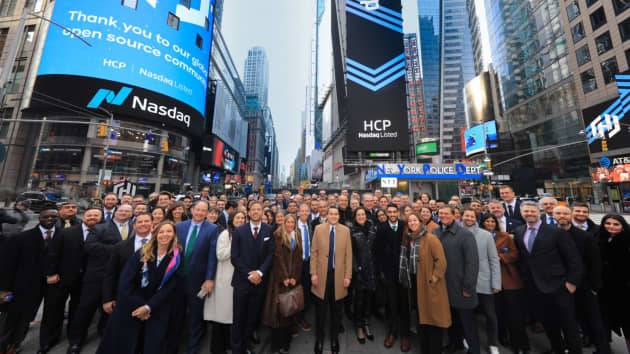When Amazon Web Services, the biggest provider of cloud-computing infrastructure, suffered an hours-long outage on Tuesday, Disney+, Netflix, Robinhood, Roku and many other popular websites and apps faced major disruptions.
The incident quickly rekindled a debate on how organizations can minimize the impact of an outage in an era when data and services are increasingly dependent on cloud data centers. Can big businesses rely on a single vendor or do they need to spread their workloads in case something like this happens again?
Two days after the AWS snafu, an emerging company called HashiCorp went public on the Nasdaq, selling a multicloud story that’s resonating among a growing number of enterprises. HashiCorp’s software helps engineers set up resources in multiple clouds — often some combination of AWS, Microsoft and Google, the three U.S. market leaders.
HashiCorp closed its second day of trading with a market cap of over $15 billion, signaling a surge in demand for its subscription software and a desire to be able to work across clouds. Revenue in the latest quarter jumped 49% to $82.2 million.
HashiCorp’s software finds use at retailer Target, which runs applications in its data centers and stores, as well as on cloud services from Microsoft Azure and Google Cloud Platform.
Mike McNamara, chief information officer at Target, left, speaks as Diane Greene, then CEO of cloud services at Google, listens during the Google Cloud Next event in San Francisco on July 24, 2018.
“I want commercial independence,” said Mike McNamara, Target’s chief information officer, in an interview. “These are relatively large amounts of money. They’re big spends. And I actually want to maintain control over the deployments and management within Target, so that I can move workloads to Azure if GCP gets expensive, or vice-versa.”
Target did not report technical issues during the Amazon downtime. The company got off Amazon’s cloud years ago, a spokesperson said.
AWS doesn’t often promote the idea of using multiple public clouds, preferring that customers stick with Amazon for all of their cloud-computing needs. For Google and Microsoft, which are eager to take market share from their larger rival, the multicloud trend is a boon.
‘You’re going to be a multicloud customer’
While learning multiple code bases requires an investment in engineering, the payoff is proving to be worth the time and money.
“Resiliency and reliability are one of several drivers toward multicloud,” said Glenn Solomon, a managing partner at venture firm GGV Capital and HashiCorp board member. GGV is HashiCorp’s second-biggest investor, with a stake worth about $2.5 billion.
Companies can gain negotiating power because adopting a second cloud might put them in a better position to reduce dependence on their primary provider. Software companies face the added risk that their main cloud provider could become a competitor. And businesses may also want to access specific capabilities from different cloud service companies.
“Whether by accident or by design, you’re going to be a multicloud customer if you’re in the Global 2000,” Armon Dadgar, a HashiCorp co-founder and the company’s technology officer, told CNBC in an interview last week.
Around 79% of Fortune 500 companies have downloaded HashiCorp’s tools, the company estimated in its IPO prospectus. HashiCorp sells subscriptions to commercial versions of popular open-source tools it’s released, such as Consul for connecting application components and Vault for managing passwords. It also sells licenses to software that companies can run in their preferred data center.
The multicloud religion that HashiCorp preaches still has skeptics.
Sam Lambert, CEO of database software start-up PlanetScale, wrote in a tweet that just because AWS ran into a problem, companies have other things to consider before deciding they need other options. It’s a costly engineering feat, and AWS has availability in many geographies, allowing users to diversify without adopting multiple vendors.
“AWS having issues still isn’t a good technical reason to do multi-cloud,” Lambert wrote.
But Steve Mullaney, CEO of Aviatrix, said the move is happening. His start-up provides software that helps organizations monitor networks across clouds.
Aviatrix was founded in 2014 and, as of three years ago, none of its clients ran in multiple clouds. Now, half of Aviatrix’s 600 customers use a single cloud, but those using multiple public clouds include Aflac, Avis, Heineken and Roche, Mullaney said.
“Everyone we talk to says they’re going to be multicloud,” he said. “In another year or two, it will probably be 90% of our customers will be multicloud, absolutely, and not because we forced them. I wish I had that superpower.”
Mullaney said he’d planned to have dinner with some customers on Tuesday, but they canceled. They had to deal with problems caused by AWS downtime.
SOURCE : CNBC




